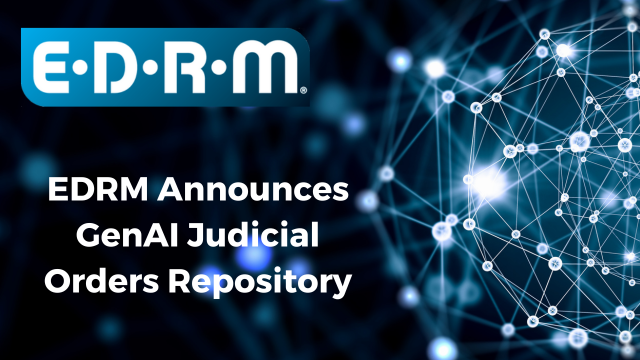EDRM Announces GenAI Judicial Orders Repository
MINNEAPOLIS, MN, USA, April 29, 2024 /EINPresswire.com/ -- Leading the way for global best practices in e-discovery, the Electronic Discovery Reference Model (EDRM) is pleased to release its repository of judicial orders concerning the use of AI curated by EDRM’s AI Ethics & Bias Project.
The EDRM’s AI Ethics & Bias group first evaluated professional responsibility considerations in AI for eDiscovery in 2023, presenting its project document called “Professional Responsibility Considerations in AI for eDiscovery: Competence, Confidentiality, Privacy and Ownership.” As part of a follow-up to that project, the group, under the direction of Khrhysna McKinney, collected various United States federal and state court local orders directed towards the use of AI (and in particular, Generative AI) in those courts’ legal practice.
"As generative AI gains maturity, so do judges in terms of providing guidance to the attorneys who may use it before their courts,” explained Khrhysna “Khrys” McKinney, principal at KL McKinney and project trustee. “Like most revolutionary periods in legal technology, the degree of trust, understanding, and adoption varies wildly as the legal community, courts included, converges to a common set of best practices. This project provides a resource for monitoring the development of court expectations during this formative period."
The EDRM has collected those local orders and considered their application and consistency for practice, curating a repository located here for EDRM member and others’ use. The orders collected were evaluated and annotated for quick reference. The EDRM AI Ethics & Bias group plans to update this repository if more United States courts adopt similar local rules and hopes that the repository will serve as a resource for practitioners who integrate AI technologies, such as Generative AI, into their day-to-day practice.
EDRM is grateful to the judicial orders project team (organizations noted for identification purposes only):
-Ricardo Baeza-Yates, Director of Research, Institute of Experiential AI at Northeastern University, U.S. (San Jose, CA)
-Tara Emory, Senior Vice President of Legal AI Strategy; General Counsel at Redgrave Data (Falls Church, Virginia)
-Irina Matveeva, Chief of Data Science and AI, Reveal (Chicago, IL)
-Khrhysna McKinney, Founder and Principal at K L McKinney (Sugar Land, TX) [Trustee]
-Jeremy Pickens, Head of Applied Science, Redgrave Strategic Data Solutions (New York, NY)
-Ariane San Miguel, Paralegal Student at Cuyamaca College (El Cajon CA)
-James Sherer, Partner at BakerHostetler (New York, NY)
“As we have seen from some recent sanctions cases, practitioners need to be very careful about how they use Generative AI, including checking the accuracy of all case citations,” said David Cohen, a Reed Smith partner and chair of EDRM’s Project Trustees. “The referenced court orders were intended to help avoid or catch some of the issues, including Gen AI hallucinations, but they also give practitioners something additional to worry about—complying with the orders in terms of prohibited uses and/or notifications. The AI Ethics and Bias Group’s repository of these rules is a valuable resource to help publicize these rules and thereby help practitioners comply."
“While not all judges believe standing orders are appropriate or needed to address this emerging advance, it is incumbent upon attorneys to be aware and comply with those who do.” said Mary Mack, EDRM’s CEO and chief legal technologist. “We expect this to be a volatile and dynamic procedural area and are grateful to our AI Ethics & Bias team for creating this community resource.”
The EDRM community is comprised of 33% corporations, 30% law firms, 23% software and service providers, and 12% governments, with the remaining 2% a mix of educators, students, judges, and media in 145 countries spanning six continents.
About EDRM
Empowering the global leaders of e-discovery, the Electronic Discovery Reference Model (EDRM) creates practical resources to improve e-discovery, privacy, security, and information governance. Since 2005, EDRM has delivered leadership, standards, tools, and guides to improve best practices throughout the world. EDRM has an international presence in 145 countries spanning six continents and growing and has an innovative support infrastructure for individuals, law firms, corporations, and government organizations seeking to improve the practice and provision of data and legal discovery. Learn more about the EDRM today at EDRM.net.
About EDRM’s AI Ethics & Bias Project
EDRM’s AI Ethics & Bias Project has been working together for three years and has published the white paper, “Professional Responsibility Considerations in AI for eDiscovery: Competence, Confidentiality, Privacy and Ownership,” which was the third most read article on JD Supra in the eDiscovery and AI categories, and this repository of judicial orders addressing AI. The project team continues to work on bias in AI and welcomes contributors. Reach out to info@edrm.net to be connected to the project team.
EDRM Media Contact
Kaylee Walstad
Chief Strategy Officer, EDRM
+1 612-804-3244
email us here
Legal Disclaimer:
EIN Presswire provides this news content "as is" without warranty of any kind. We do not accept any responsibility or liability for the accuracy, content, images, videos, licenses, completeness, legality, or reliability of the information contained in this article. If you have any complaints or copyright issues related to this article, kindly contact the author above.


